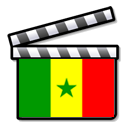Related Research Articles

Jean Rouch was a French filmmaker and anthropologist.

Ousmane Sembène, often credited in the French style as Sembène Ousmane which he seemed to favor as a way to underscore the "colonial imposition" of this naming ritual and subvert it, was a Senegalese film director, producer and writer. The Los Angeles Times considered him one of the greatest authors of Africa and he has often been called the "father of African film". Descended from a Serer family through his mother from the line of Matar Sène, Ousmane Sembène was particularly drawn to Serer religious festivals especially the Tuur festival.
The Prix Jean Vigo is an award in the French cinema given annually since 1951 to a French film director, in homage to Jean Vigo. Since 1960, the award has been given to both a director of a feature film and to a director of a short film.

Cinema of Africa covers both the history and present of the making or screening of films on the African continent, and also refers to the persons involved in this form of audiovisual culture. It dates back to the early 20th century, when film reels were the primary cinematic technology in use. During the colonial era, African life was shown only by the work of white, colonial, Western filmmakers, who depicted Africans in a negative fashion, as exotic "others". As there are more than 50 countries with audiovisual traditions, there is no one single 'African cinema'. Both historically and culturally, there are major regional differences between North African and sub-Saharan cinemas, and between the cinemas of different countries.
Oumarou Ganda was a Nigerien director and actor who helped bring African cinema to international attention in the 1960s and 1970s.

Jean Suret-Canale was a French historian of Africa, Marxist theoretician, political activist, and World War II French Resistance fighter.
The Cinema of Niger began in the 1940s with the ethnographical documentary of French director Jean Rouch, before growing to become one of the most active national film cultures in Francophone Africa in the 1960s-70s with the work of filmmakers such as Oumarou Ganda, Moustapha Alassane and Gatta Abdourahamne. The industry has slowed somewhat since the 1980s, though films continue to be made in the country, with notable directors of recent decades including Mahamane Bakabe, Inoussa Ousseini, Mariama Hima, Moustapha Diop and Rahmatou Keïta. Unlike neighbouring Nigeria, with its thriving Hausa and English-language film industries, most Nigerien films are made in French with Francophone countries as their major market, whilst action and light entertainment films from Nigeria or dubbed western films fill most Nigerien theatres.
Paulin Soumanou Vieyra was a Dahomeyan/Senegalese film director and historian. As he lived in Senegal after the age of 10, he is more associated with that nation.
The Grand prix littéraire d'Afrique noire is a literary prize presented every year by the ADELF, the Association of French Language Writers for a French original text from Sub-Saharan Africa. It was originally endowed with 2,000 french francs.

The cinema of Senegal is a relatively small film industry which experienced its prime from the 1960s through to the early 1980s, but has since declined to less than five feature films produced in the last ten years. Senegal is the capital of African cinema and the most important place of African film production after its independence from France in 1960.
Pius Ngandu Nkashama was a professor, writer, playwright, poet and literary critic. He was born September 4, 1946 in Mbujimayi in the province of Kasai Oriental in the Democratic Republic of the Congo. He died on December 19, 2023 in Baton-Rouge, Louisiana, US.
Olivier Barlet is a French journalist, translator, film critic and researcher on African cinema and its diasporas.
Richard De Medeiros is a Beninese film director.
Claude Haffner, is a French-Congolese filmmaker and production manager primarily direct documentary films. She has made several critically acclaimed documentaries including Ko Bongisa Mutu, Défilé Célianthe and Noire ici, blanche là-bas.
Isidore Ndaywel è Nziem, is a Congolese historian and linguist. He is the author of several essays, studies and other publications about the history of the Congo, including the overview work L'histoire générale du Congo: De l'héritage ancien à la République démocratique.

Jean-Pierre Makouta-Mboukou was a Congolese politician, academic, novelist and playwright. For his abundant and eclectic work his biographers have called him the “Congolese Victor Hugo” and the “baobab of Congolese literature”.

Pierre-André Boutang was a French documentary filmmaker, producer and director. He was one of the leaders of the Franco-German channel Arte as well as of La Sept previously.
Thierno Faty Sow was a Senegalese filmmaker, screenwriter and actor.
Clarence Thomas Delgado is a Senegalese film director, film producer, screenwriter and camera operator.
The Festival des Cinémas d'Afrique du pays d'Apt (FCAPA) is an annual international film festival on African cinema organised since 2003 in Apt, Vaucluse, France.
References
- ↑ Olivier Barlet (2016). Contemporary African Cinema. MSU Press. p. 128. ISBN 978-1-62895-270-4.
- 1 2 'Pierre Haffner', Notre Librarie: Revue des literatures du Sud (Cinemas d'Afrique), 2002.
- ↑ Haffner, Pierre (2008). "Sembène Ousmane in Kinshasa". Ousmane Sembène: Interviews. Univ. Press of Mississippi. pp. 82–. ISBN 978-1-934110-86-7.